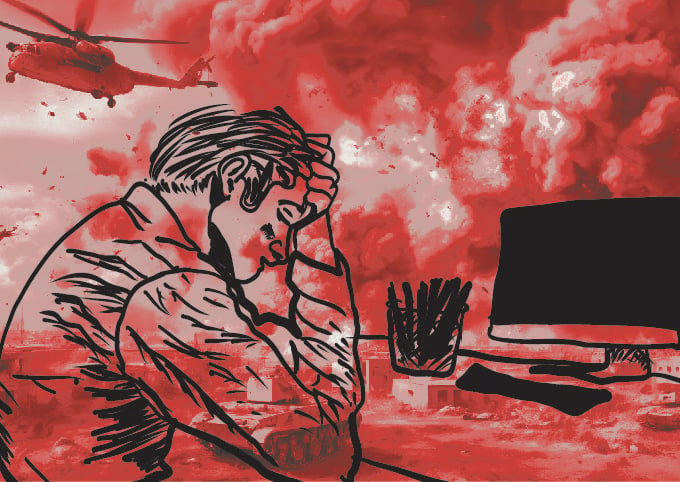Strategizing from 7 cities across the globe
Sanity is Money
Lebanon’s history overflows with conflict and displacement. Fast forward to the past few years, a series of economic crises - maybe the worst in the country's history - have burdened the population and eroded people’s ability to access basic goods.
PSYCHOLOGYMENTAL HEALTHECONOMICSWARTRAUMA
Francesca Wakim
10/28/20245 min read


Lebanon’s history overflows with conflict and displacement. Fast forward to the past few years, a series of economic crises - maybe the worst in the country's history - have burdened the population and eroded people’s ability to access basic goods.
Yet, on the other side of the story resides the overwhelming dark shadow of the war taking place nowadays. One’s mind cannot even start grasping the ripple effect this war will create, not only in terms of individual well-being but also when it comes to collective societal productivity. Thus, the crisis and the war are not separate in terms of consequences, as the common psychological toll they have produced is causing a massive productivity regression.
War in Lebanon is not just a passing crisis but a deeply ingrained reality for many Lebanese citizens who have grown up in conflict zones. It possesses the power to lead the population towards surrender due its ongoing impact on their mental health. Unfortunately, this psychological trauma does not only impacts individuals, but will also affect the labor’s ability to contribute to the nation’s economic and social recovery.
In order to unveil the future of Lebanon’s economic growth, it is paramount to consider the value of sanity aggregately. We must correlate individual health with monetary value, as a loss of sanity is a loss of productivity. The mental drawback is usually an unconscious phenomenon, one that specifically manifests in disorders like the Post-Traumatic Stress Disorder (PTSD).
PTSD is one of the most common outcomes of prolonged exposure to violence. Simply put, it is particularly prevalent among people who have witnessed bombings, shootings, and the destruction of their homes. Symptoms such as nightmares, flashbacks, and emotional numbness impair individuals' ability to function effectively in their daily lives, let alone contribute meaningfully to their workplaces or society.
One might think that PTSD only affects combatants, not taking into consideration the witnesses of chaos. During and post-war, it affects civilians including children, women, and the elderly, resulting in difficulties of concentration, memory lapses, and an inability to cope with workplace stress. Thus, directly lowering productivity levels.
In addition, if we zoom in a little bit, it is obvious to anyone that the constant threat of violence, the loss of loved ones, and the destruction of homes will lead to overwhelming depression and anxiety. This is particularly evident in displaced populations who have lost their sense of stability and control over their lives. While depression creates a lack of motivation, chronic fatigue, and absenteeism in work and educational settings, anxiety can cause hypervigilance, making it difficult for individuals to engage in tasks that require focus and long-term planning.
Moreover, people living in war zones usually suffer from emotional exhaustion due to the constant need to survive. In a state of survival, individuals prioritize their basic needs, such as safety, food, and shelter, over professional or academic pursuits. This distress results in reduced energy and commitment to work, lower productivity, and difficulty making decisions. Prolonged exposure to trauma can lead to cognitive impairments that impact memory, attention, and problem-solving skills. War-induced trauma rewires the brain to be more alert to danger, reducing cognitive capacity for other tasks. In Lebanon, individuals may struggle with daily job demands, might find it hard to concentrate on studies, and may even fail to complete simple tasks due to the lingering effects of trauma.
Beyond the personal toll, we witness that war and displacement significantly disrupt collective societal productivity. Lebanon’s workforce has been repeatedly disrupted due to displacement, with millions of people forced to flee their homes, often leaving behind jobs and livelihoods. Businesses lose employees and displaced skilled professionals migrate to other countries, leaving a gap in the labor market. It definitely would not be the first time that Lebanon witnesses a significant reduction in economic activity due to war, particularly in sectors like agriculture, construction, and manufacturing, where displaced workers make up a substantial portion of the workforce.
So far, war has driven many capable professionals, including doctors, engineers, educators, and entrepreneurs, out of Lebanon in search of stability and safety. This “brain drain” has a crippling effect on Lebanon’s economy. The departure of highly skilled workers means that the country loses not only valuable expertise, but also the potential for innovation and economic development. Migration caused by displacement will weaken the professional sectors, limiting Lebanon’s capacity to rebuild once the war subsides.
It is no secret that the artillery exchange devastatingly impacts the educational sector, especially for children and young adults who represent the future workforce. Generally, schools in conflict zones have shut down while others in safer areas are hosting displaced people, disrupting the curriculum of the year. The psychological toll on children - who are more vulnerable to trauma than adults - leads to behavioral issues and difficulties in concentrating and learning. A technological regression would be obvious as the store of human capital within the next generation will become more costly mentally and would decrease.
Furthermore, Lebanon’s already fragile education system struggles to cope with the influx of displaced students, putting additional strain on teachers and school infrastructure. Clearly a generation of youth with limited skills and education will severely hamper productivity in the future.
Not to be outdone, the current events disproportionately affect women, who are typically the caregivers in times of crisis. Many women find themselves responsible for supporting their families under extreme stress, further compromising their ability to participate in the workforce. The trauma experienced during war often leads to increased rates of domestic violence and exploitation, further affecting women’s mental health and ability to engage in economic activities. It is also a game of allocation of resources; in order to cope with this domestic violence, it is the duty of the public sector and NGOs to increase expenditure towards supporting these women, resulting in a discouragement of subsidies within other productive sectors.
So, what do you think happens when people feel that there is no clear future or hope? The overwhelming feelings of despair and helplessness will crush motivation. Naturally, they are less likely to invest in work or personal growth. We know by now that productivity relies heavily on a sense of purpose, which is predominantly lost during times of war. Economically speaking, this burden of anxiety can be manifested as an external cost AX, which would make the accomplishment of a task more costly as sanity comes into play, leading to a lesser willingness to work for a similar aggregate benefit.
Lebanon has always been far from being a haven for mental health awareness. This is even more accentuated with the dire situation today. The limited resources to address mental health challenges mean that many individuals will not receive the psychological support they need to counterweigh the loss of sanity. Untreated issues will worsen over time, making it even harder for people to return to productive routines once the crisis subsides.
For centuries, economists have insisted on the scarcity of time, proclaiming that time is money. In a mad world, sanity is becoming more and more monetarily valuable. As you can see, the psychological impact of prolonged violence and displacement on productivity in Lebanon is vast and multifaceted. It would be of no surprise if the country experiences a recession, accounting for the increasing external cost that will potentially lead to lower profit due to loss of efficiency. On both the individual and collective levels, war disrupts cognitive functioning, workplace participation, education, and national economic stability. It goes without saying that Lebanon’s path to recovery will require a concerted effort to address the mental health needs of its population, rebuild education systems, and invest in economic recovery. Without these efforts, the long-term effects of war and displacement will continue to undermine the country’s potential for growth and prosperity. We continuously hear that our health is our greatest wealth, and that is where sanity lies.
References
UNHCR (2020). Lebanon and Displacement: A Long History of Conflict.
The Lancet Psychiatry (2021). Mental Health and Conflict Zones: The Case of Lebanon.
BMC Public Health (2019). Trauma, Mental Health, and Productivity in Post-Conflict Societies: Evidence from Lebanon.
